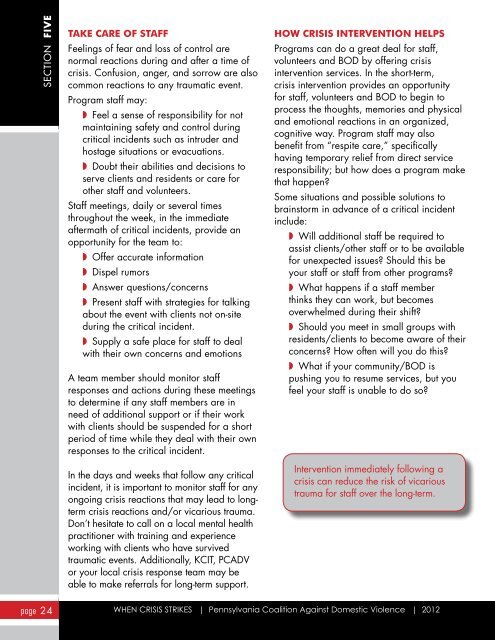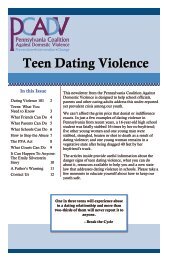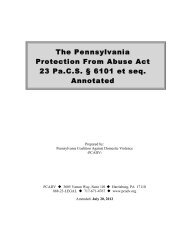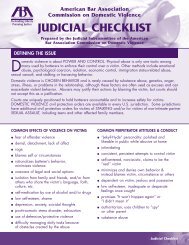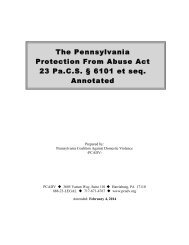Toolkit with Report Form - Pennsylvania Coalition Against Domestic ...
Toolkit with Report Form - Pennsylvania Coalition Against Domestic ...
Toolkit with Report Form - Pennsylvania Coalition Against Domestic ...
Create successful ePaper yourself
Turn your PDF publications into a flip-book with our unique Google optimized e-Paper software.
Section five<br />
Take Care of Staff<br />
Feelings of fear and loss of control are<br />
normal reactions during and after a time of<br />
crisis. Confusion, anger, and sorrow are also<br />
common reactions to any traumatic event.<br />
Program staff may:<br />
◗ Feel a sense of responsibility for not<br />
maintaining safety and control during<br />
critical incidents such as intruder and<br />
hostage situations or evacuations.<br />
◗ Doubt their abilities and decisions to<br />
serve clients and residents or care for<br />
other staff and volunteers.<br />
Staff meetings, daily or several times<br />
throughout the week, in the immediate<br />
aftermath of critical incidents, provide an<br />
opportunity for the team to:<br />
◗ Offer accurate information<br />
◗ Dispel rumors<br />
◗ Answer questions/concerns<br />
◗ Present staff <strong>with</strong> strategies for talking<br />
about the event <strong>with</strong> clients not on-site<br />
during the critical incident.<br />
◗ Supply a safe place for staff to deal<br />
<strong>with</strong> their own concerns and emotions<br />
A team member should monitor staff<br />
responses and actions during these meetings<br />
to determine if any staff members are in<br />
need of additional support or if their work<br />
<strong>with</strong> clients should be suspended for a short<br />
period of time while they deal <strong>with</strong> their own<br />
responses to the critical incident.<br />
In the days and weeks that follow any critical<br />
incident, it is important to monitor staff for any<br />
ongoing crisis reactions that may lead to longterm<br />
crisis reactions and/or vicarious trauma.<br />
Don’t hesitate to call on a local mental health<br />
practitioner <strong>with</strong> training and experience<br />
working <strong>with</strong> clients who have survived<br />
traumatic events. Additionally, KCIT, PCADV<br />
or your local crisis response team may be<br />
able to make referrals for long-term support.<br />
How Crisis Intervention Helps<br />
Programs can do a great deal for staff,<br />
volunteers and BOD by offering crisis<br />
intervention services. In the short-term,<br />
crisis intervention provides an opportunity<br />
for staff, volunteers and BOD to begin to<br />
process the thoughts, memories and physical<br />
and emotional reactions in an organized,<br />
cognitive way. Program staff may also<br />
benefit from “respite care,” specifically<br />
having temporary relief from direct service<br />
responsibility; but how does a program make<br />
that happen?<br />
Some situations and possible solutions to<br />
brainstorm in advance of a critical incident<br />
include:<br />
◗ Will additional staff be required to<br />
assist clients/other staff or to be available<br />
for unexpected issues? Should this be<br />
your staff or staff from other programs?<br />
◗ What happens if a staff member<br />
thinks they can work, but becomes<br />
overwhelmed during their shift?<br />
◗ Should you meet in small groups <strong>with</strong><br />
residents/clients to become aware of their<br />
concerns? How often will you do this?<br />
◗ What if your community/BOD is<br />
pushing you to resume services, but you<br />
feel your staff is unable to do so?<br />
Intervention immediately following a<br />
crisis can reduce the risk of vicarious<br />
trauma for staff over the long-term.<br />
page 24<br />
When Crisis Strikes | <strong>Pennsylvania</strong> <strong>Coalition</strong> <strong>Against</strong> <strong>Domestic</strong> Violence | 2012


